Germany Sees Increase In Iranian Spying On Dissidents Since Protests
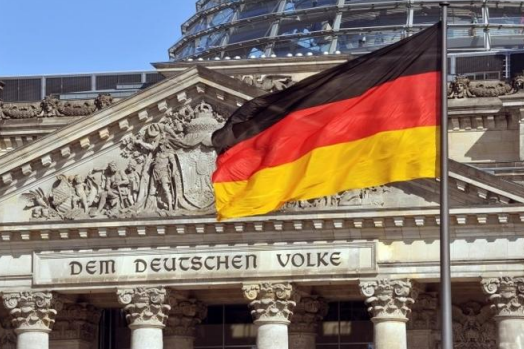
Germany has acknowledged an increase in spying by Iranian agents on exiled Iranians since the start of mass protests last year, Welt am Sonntag newspaper reported on Saturday.

Germany has acknowledged an increase in spying by Iranian agents on exiled Iranians since the start of mass protests last year, Welt am Sonntag newspaper reported on Saturday.
Nationwide unrest triggered by the death of a young woman detained by Iranian morality police last year has led to "increasing indications of possible spying on opposition events and individuals" in Germany, the federal government said in response to an information request from the far-left Linke Party.
"Opposition groups and individuals (...) are considered by the rulers in Iran as a threat to the continued existence of the regime," the government said in its response.
It said the country's domestic intelligence service had identified 160 individuals with links to Germany as well as the Iranian Revolutionary Guards.
The Islamic Republic has persecuted exiled dissidents for four decades, often threatening, assassinating or kidnapping activists in Europe, including a former prime minister and several journalists.
The Revolutionary Guards' "extensive spying activities" are directed in particular against pro-Israeli and pro-Jewish targets in Germany, the newspaper cited the government as saying.
Demonstrations that first erupted in September over the death of a 22-year-old Kurdish woman who had been placed in detention by police enforcing the Islamic Republic's strict restrictions on women's dress have turned into the biggest protests in years.
Reporting by Reuters
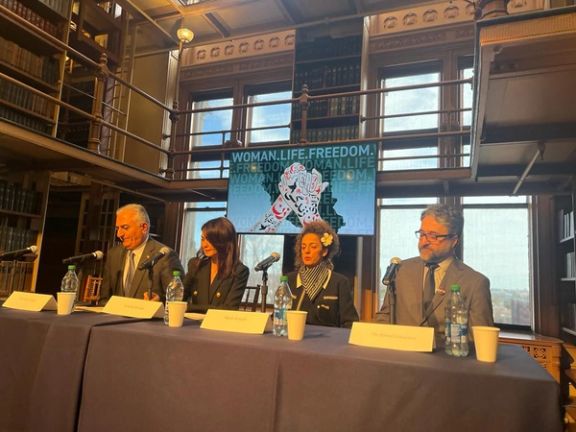
In a historic event eight leading Iranian opposition figures have called for support from democratic countries to change the regime in Iran and establish democracy.
At an event at Georgetown University's Institute for Women, Peace and Security (GIWPS) -- titled ‘The Future of Iran’s Democracy Movement' -- held on Friday on the eve of the 44th anniversary of the establishment of the Islamic Republic, the prominent activists pledged unity for the single purpose of bringing democracy to Iran.
The speakers, all emphasizing the importance of unity against the Islamic Republic also argued that now is not the time to argue about the exact form of a future democratic government in Iran.
Both constitutional monarchy and a republican form of government have their supporters among Iranians.
Exiled Prince Reza Pahlavi, Nobel laureate Shirin Ebadi and Canada-based activist Hamed Esmaeilion, whose daughter and wife were killed in the shooting down of Flight PS752 downed by Iran’s Revolutionary Guard in 2020, as well as US-based author, journalist and women’s rights activist Masih Alinejad, actresses and activists Nazanin Boniadi and Golshifteh Farahani, former captain of Iran’s national soccer team Ali Karimi and Secretary General of Komala Iranian Kurdish party Abdullah Mohtadi were four women and four men who spoke at the event.
Pahlavi, Boniadi, Alinejad and Esmaeilion were present in the room, while Ebadi, Mohtadi and Farahani delivered video messages.
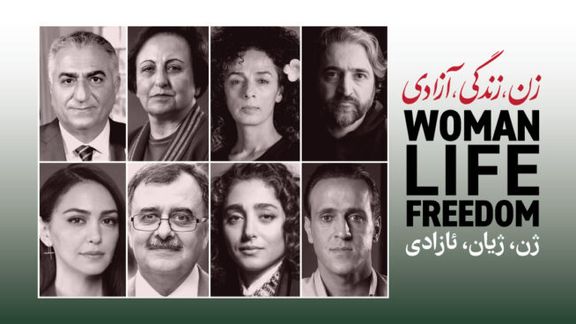
The event can become a turning point in shaping a united leadership abroad to represent the democracy movement in Iran, where activists have no chance of publicly defending it. Thousands of protesters are still in prison and dozens face the death sentence.
All speakers emphasized that the protest movement is alive and strong in Iran and it needs support from democratic countries. They pledged to work for a new form of government that would be democratic, secular and bring equality, justice and progress to Iran.
The activists representing the protest movement said that they are working on a charter for their group by the end of February and hope to lay the foundations for political representation of the aspirations of protesters in Iran and gain support for isolating the Islamic Republic.
Nobel Laureate Shirin Ebadi referring to the Islamic Republic's ruler Ali Khamenei said, "Dictator say hello to the end."
"It's not a time for infighting. The overthrow of the regime is not possible without unity and empathy," said Ebadi.
"Let's leave differences for the election. We will move hand-in-hand to a better future," she said in her video message.
Abdullah Mohtadi, a Kurdish political leader said that because of Mahsa Amini's killing by the regime, Islamic Republic's falsehood has been shattered.
Actress Golshifteh Farahani, also speaking on behalf of Ali Karimi, said that now is the time for unity and any Iranian sowing divisiveness is committing treason.
Well-known US-based activist Masih Alinejad emphasized the urgency of isolating the Islamic Republic in the world arena.
Hamed Esmaeilion, Nazanin Boniadi and Prince Reza Pahlavi emphasized emphasized equality, justice freedom and the common destiny binding Iranians.
Alinejad said that the group was working on a charter for a transition that would be ready at the end of the month. "We must agree on minimal principles," she said, adding: "The world must prepare itself for a day without the Islamic republic."
"The next wave [of protests] will come and it will be heavier," Esmaeilion said.
"We can organize and plan so, when the next wave comes, all of us are ready and we can transition away from the Islamic republic."
Prince Reza Pahlavi, who has long campaigned for a secular and democratic Iran rather than any restoration of the monarchy, said, "The time has come to consolidate our positions, put aside differences. The time has come to put aside slogans, roll up our sleeves and begin our work."
Updated at 22:00 GMT
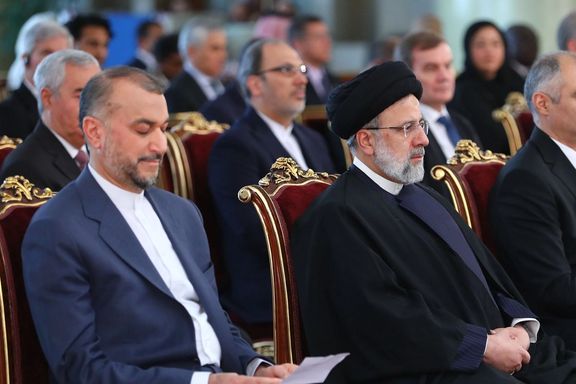
“Amir-Abdollahian must be the foreign minister of Switzerland, not Iran” quipped commentator Mohammad Mohajeri referring to his interview with the National Public Radio.
Mohajeri, a conservative pundit, was singling out Hossein Amir-Abdollahian’s remark in the NPR interview this week where he insisted that no journalists or students were arrested in Iran during the protests.
“I think Mr. Amir-Abdollahian is Switzerland’s foreign minister, not Iran’s,” Mohajeri was quoted as saying on Friday. He added that either Amir-Abdollahian is Switzerland’s foreign minister or is uninformed about events in Iran.
“What he has said contradicts all the available information in the media and in the world. These kinds of statements result in nothing but showing that our foreign minister is uninformed,” Mohajeri maintained.
He argued that President Ebrahim Raisi’s government has not presented any figures on how many people have been arrested during the protests. When officials remain silent, Amir-Abdollahian has no source to claim that no journalists and students were detained. Nevertheless, he emphasized that such gaffes discredit both the foreign minister and the government.
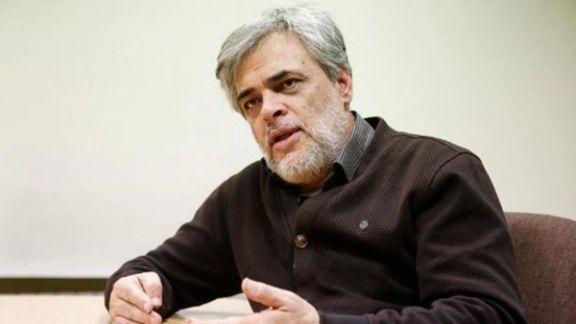
However, this is not the first time that an Iranian chief diplomat has tried to ignore or misrepresent facts in his attempt to defend the authoritarian regime. Former foreign minister Mohammad Javad Zarif, who was much more popular with Western media, regularly denied human rights violations committed by his government.
As far back as 2015 when Zarif was negotiating the JCPOA nuclear deal with the United States, he told PBS that “We do not jail people for their opinions… But people who commit crimes, who violate the laws of the country, cannot hide by being a journalist, being a political activist.”
At the time, these remarks led to a lot of backlash, but Iran’s human rights violations were not the priority of Western powers during the race to sign a nuclear agreement.
In the 2019 Munich Security Conference Zarif refused to answer BBC’s questions about Iran’s human rights record and the jailing of eight environmentalists for no reason. Instead, he immediately brought up Jamal Khashoggi’s killing and Britain’s arms sales to Saudi Arabia.
But by then Zarif was bitter about the US decision to pull out of the 2015 nuclear deal and Iran’s growing isolation, while for years he had tried to woe the Western media by smiling into the cameras.
Meanwhile, a former official Hamid Abutalebi criticized President Ebrahim Raisi’s remarks on Thursday during his meeting with foreign ambassadors on the occasion of the Islamic Republic’s 44th anniversary.
Raisi had nothing new to say about Iran’s nuclear dispute with the West, Abutalebi noted, simply repeating the same punchlines that would not impress anyone.
Iran is ready for a “just” agreement and always shows good will to achieve it, Raisi said. The United States, and lately its European allies, are immersed in “delusions and miscalculations,” Raisi added.
What the diplomats who were present read in these remarks, Abutalebi argued, was that Iran is not ready to finalize the nuclear negotiations and secure the lifting of sanctions. “A good agreement for Tehran is insisting on its old demands,” he quipped.
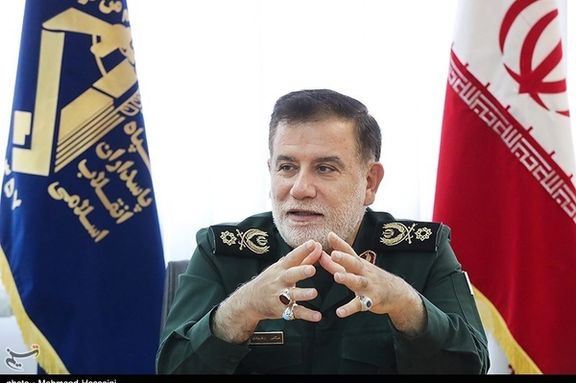
As the Islamic Republic is celebrating the 44th anniversary of its establishment, top military commanders Friday issued threats warning of consequences of “enmity with Iran.”
The Revolutionary Guard’s Deputy Commander for Operations Abbas Nilforoushan said that the US has paid a heavy toll for its enmity with the Islamic Republic, warning the European countries for their positions against the regime.
Repeating the Islamic regime’s propaganda line that blames foreign countries for the ongoing protests triggered by the death of Mahsa Amini in mid-September, Nilforoushan said the enemies did their best to instigate “riots” across the country. “They activated their operational bases in the region and the US, and orders for riots were constantly issued from these bases," he said.
Islamic Republic officials use the term “enemies” to refer to the United States and its allies.
He also defended the regime’s intensified military crackdown in Kurdish-majority areas and bases of Iranian Kurds in Iraq, saying that the IRGC “smashed the center of sedition in the Kurdistan region with point-blank missiles.”
Defense Minister Mohammad-Reza Gharaei Ashtiani said the Islamic Republic has the capability to identify the weaknesses and vulnerabilities of the enemy and plan how to hit them. He also claimed that the country was dependent on the West before the 1979 revolution, saying “The Shah's government was a dictatorial regime completely dependent on the West.”
Also on Friday, IRGC Ground Forces Commander Mohammad Pakpour said despite various conspiracies by the enemies, the Islamic Republic is at the peak of its power and the people of Iran will deal a decisive blow to the enemies on the anniversary of the Islamic Revolution. By “dealing a blow,” he was probably referring to a large turnout in the state-sponsored celebrations and street rallies on February 11.
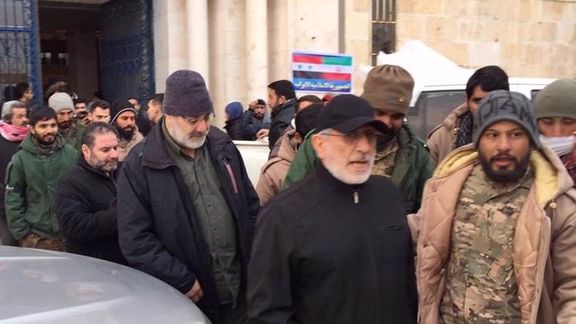
Israel has warned the Islamic Republic against sending arms to Syria under the guise of humanitarian aid meant for the earthquake hit people of the country.
The Saudi-owned Elaph news site quoted an unnamed Israeli military official as saying any move by Tehran to send weapons to Syria will be met with military response by the IDF "without hesitation.”
“There is information indicating that Iran will take advantage of the tragic situation in Syria” and ship weapons to the Hezbollah terror organization and other Iran-backed groups in Syria, the source said, adding that Israel would not accept this and it would result in a “firm military response from us without hesitation.”
Several Iranian cargo planes reportedly carrying aid have landed in Syria since Monday’s major earthquake in southeast Turkey, that has killed more than 20,000 people in both countries as of Thursday evening.
Esmail Ghaani, who heads Iran’s Revolutionary Guard extraterritorial Quds Force, was seen in Aleppo on Wednesday to supervise Iranian rescue operations.
Several airstrikes against alleged Iranian weapons shipments disguised as seemingly harmless products have been attributed to Israel in recent years, including last month.
Israeli air strikes targeting Iran-linked assets in Syria focused on airports as the Islamic Republic is trying to step up its presence while Russia is entangled in Ukraine.
Israeli and American officials have reportedly made a deal to cooperate over covert and semi-covert operations inside Iran.
Late in January, a drone attack hit a military factory in the central city of Esfahan. Blaming Israel, Tehran vowed revenge for the latest episode in a long-running covert war.
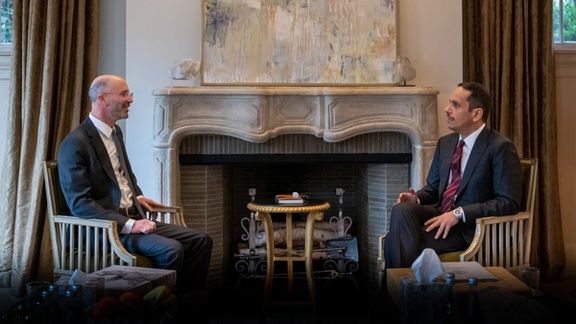
US Special Envoy for Iran Robert Malley met Thursday with the Qatari foreign minister in Washington over efforts to kickstart the stalled talks to revive the 2015 nuclear deal, Qatari sources said.
Deputy Prime Minister and Minister of Foreign Affairs Sheikh Mohammed bin Abdulrahman Al Thani and Malley also discussed bilateral relations in addition to a number of issues of common interest.
Late in January, Al Thani visited Tehran where he delivered messages from world powers that are party to the Joint Comprehensive Plan of Action, particularly the US which does not have direct contact with the Islamic Republic.
“Qatar has been always passing on messages about the return of the JCPOA parties to their commitments. Today, we received JCPOA-related messages from the Qatari side,” Iran’s foreign minister Hossein Amir-Abdollahian stated.
The Qatari foreign minister also urged all parties to return to the agreement.
Talks to revive the JCPOA reached a deadlock last September after 18 months of negotiations.
These statements come as US officials have repeatedly said that their focus is not on the JCPOA negotiations any longer, but Washington is rather focused on the Islamic Republic’s suppression of its people and Tehran’s military support for Russia in the invasion of Ukraine.
The European parties to the JCPOA have also expressed a similar view, with Germany saying that "Berlin's main focus is on supporting the protest movement in Iran."